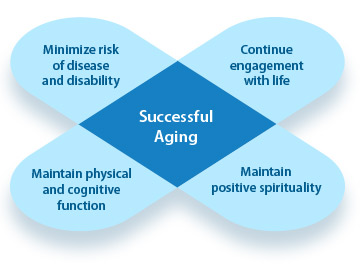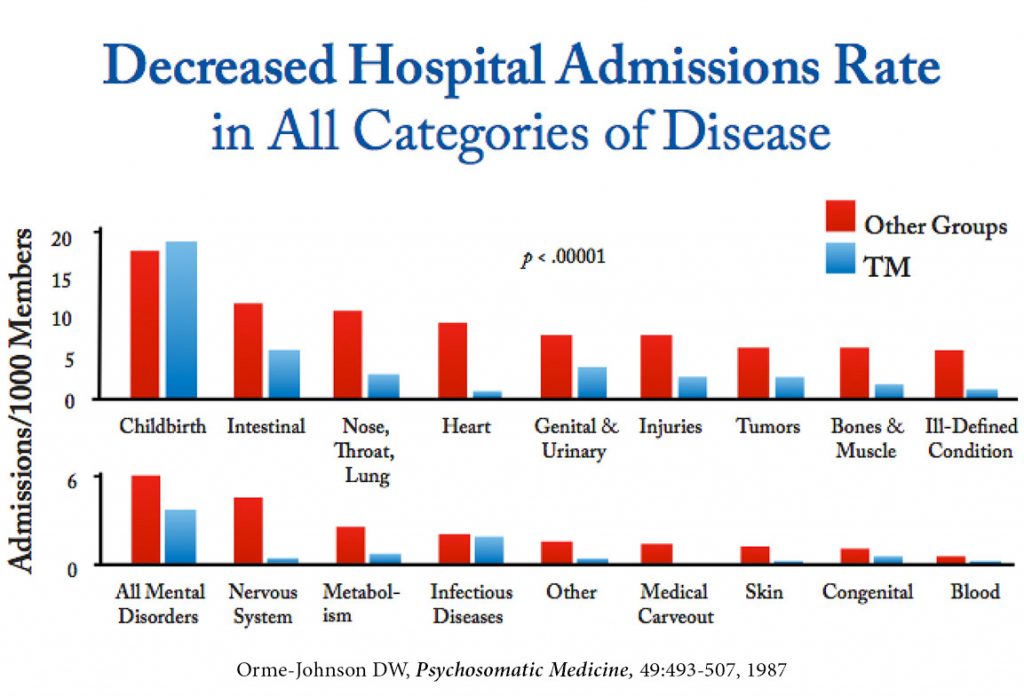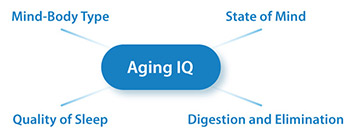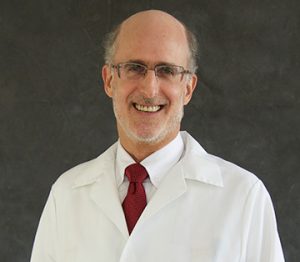This article is the first in a series from internationally renowned physician and researcher Dr. Robert Schneider, who offers a revolutionary approach to living longer and healthier, combining cutting-edge science and Maharishi AyurVeda®. He is Dean of the College of Integrative Medicine and Director of the Institute for Natural Medicine and Prevention at Maharishi University of Management. His research has been supported by $25 million in grants from the National Institutes of Health and other agencies and published in 150 scientific publications.
Everybody ages. And almost everyone over the age of 40—half of the U.S. population—would like to live longer, without the declines in physical, cognitive, and emotional health that we commonly experience as the years pass.
Are the declines associated with this usual aging inevitable? Modern and ancient medical science agree that they’re not.

Based on Rowe, Kahn (1997) and Crowther (2002).
In fact, doctors and scientists have identified a minority of people, perhaps 20 percent or so, who age successfully, with longer health spans of high physical, cognitive, emotional, and social functioning.
They don’t get sick very often, and they avoid chronic disorders such as heart disease, dementia, depression, diabetes, and cancer. They stay mentally sharp, are actively engaged with life, and tend to be emotionally and spiritually fulfilled, continuing to flourish and contribute to their families and communities well into their 80s, 90s, and beyond.1
Super Agers and Blue Zones
What do these super agers know that most folks don’t? Modern medical science has discovered that they share several common lifestyle characteristics found in Blue Zones—communities oriented around healthy lifestyles where it is common to live more than 100 years with full functional ability.2 Here are some of the lifestyle principles found in Blue Zones.
7 Longevity Lessons from Blue Zones
1. Move naturally—Be physically active in daily life.
2. Eat moderately—Eat until you’re 80 percent full, which cuts calories by 20 percent.
3. Consume a plant-based diet—Bump up your intake of fruits, veggies, legumes, and whole grains, and avoid meat and processed foods.
4. Down shift—Relieve stress, as in your twice-daily Transcendental Meditation® (TM) practice; rest and relax regularly.
5. Have purpose—Determine your life purpose and live by it.
6. Enjoy social support—Make family, loved ones, and your social circle a priority.
7. Belong—Participate in a spiritual practice and community.
Blue Zones may sound exotic, but chances are, you may not have to go far to find one. Fairfield, Iowa, home of Maharishi University of Management and nearly 3,000 TM practitioners, is a Blue Zone. Research indicates that the meditating residents of Fairfield show lower rates of disease, hospitalization, and health care costs.
Whether you’re in your 30s or your 70s, the lessons learned in these communities of super agers apply to you, in effect allowing you to design your aging process.

A New Discovery—Lifestyle Is More Important Than Genes
What’s one of the key discoveries of this new science of aging? Successful aging depends more on lifestyle choices than on our genes—as most of us previously believed. Recent studies indicate that only about 25 percent of how long we live is due to our genes.3 Now we know that how one ages is primarily a choice.
The emerging science of epigenetics—the study of how gene expression can be turned on or off by environmental influences— tells us that we can manage our genes and influence our DNA through how we manage our mind, body, and even our environment.4
Successful aging depends more on lifestyle choices than on our genes—as most of us previously believed. Now we know that how one ages is primarily a choice.
This is corroborated by the discovery of telomeres—the caps at the end of our DNA molecules. The length of our telomeres can predict how long and disease-free we will live.5
The new science of aging integrates the discoveries of modern science with those of ancient health science. It tells us that there is a range of lifestyle and behavioral choices that we can easily make to modify our aging. These include how we eat, digest, exercise, maintain our weight, supplement our diets, sleep, and manage our stress.
This last factor points to another central finding: The mind-body connection contributes greatly to living a long, healthy, and happy life. Simply put, stress speeds aging. And effective stress reduction slows it down.
TM Reverses the Aging Process
Research conducted in the 1980s was the first to show that practicing the Transcendental Meditation technique was associated with a younger biological age—an average of 12 years younger in subjects who practiced TM regularly for five years or more.6
Since then, my colleagues and I have conducted several controlled studies sponsored by the National Institutes of Health that found that TM practice reduced blood pressure, which normally rises with advancing age, and also reduced the incidence of heart disease and stroke by almost 50 percent.7 Our latest research suggests that TM practice also enhances the repair and lengthening of telomeres.8
TM practice reduced blood pressure, which normally rises with advancing age, and also reduced the incidence of heart disease and stroke by almost 50 percent.
This culminates in a most striking finding: Rigorous studies demonstrate that older individuals who practice TM show lower rates of mortality—that is, they live significantly longer with better physical and mental health than controls who do not meditate.9 These studies show that if you’re practicing TM, and especially if you’re practicing on a regular basis, you’re already well on your way to super aging.
Reviving the Ancient Knowledge of Life and Lifespans
Fortunately, modern medical science is also discovering the secrets of an ancient health system that has been scientifically shown to prevent and slow the aging process—Ayurveda, in particular Maharishi AyurVeda®. This holistic approach to aging enhances the mind and body from deep within, using the wisdom of the body’s inner intelligence.
Ayurveda means knowledge (Veda) of life and lifespan (Ayus). As the world’s oldest, most complete and sophisticated tradition of health care, its Vedic texts and records of continuous clinical practice go back for thousands of years in India.
In the early 1980s, Maharishi Mahesh Yogi, TM’s Founder, began reviving Ayurveda in a comprehensive, scientific framework, in collaboration with leading traditional practitioners, physicians, and scientists. This system, known as Maharishi AyurVeda, restores the understanding of consciousness as the inner intelligence within everyone. It therefore offers a uniquely holistic set of methods for longevity.
Maharishi AyurVeda offers a simple, yet comprehensive program to enhance longevity and well-being—and to promote successful aging, even super aging.
Maharishi AyurVeda is what modern science calls a systems approach to health, because it includes all the elements in our inner and outer ecosystem that influence human health, well-being, and aging. All its practical technologies enliven the inner intelligence that promotes wellness in our mind and body. These include personalized methods based on our particular mind-body types, as well as the TM technique.
Maharishi AyurVeda offers a simple yet comprehensive program to enhance longevity and well-being—and to promote successful aging, even super aging. It has this capacity because it holistically considers how you age as an individual—with unique characteristics, circumstances, and causative factors—from the inside out.
Balance Is the Key to Anti-Aging
The central theme of Maharishi AyurVeda is that the secret to anti-aging—indeed to all of health—is balance, or the homeostasis of the fundamental elements that make up our body and mind. When our foundational physiological systems are in balance, their functioning expresses the underlying biological intelligence inherent in our DNA, the inner intelligence of the body.
When balance is restored to our body’s self-repair and homeostatic mechanisms, our biological intelligence flows freely from deep within our DNA to all our cells, tissues, organs, organ systems, and ultimately, our whole person.
What Is Your Aging IQ?
In subsequent articles in this series, I will go into each of these topics in depth, laying out practical tips that you can use to optimize your aging process.

The four factors that determine your Aging IQ
I will show you how to easily assess your Aging IQ by first determining what your mind-body type is, and then adding in your patterns of sleep, state of mind, digestion and elimination, and energy. Then you can find out how these patterns contribute to your own personal style of mind-body aging.
Once you know your Aging IQ, you can tailor your diet, behavioral routine, stress-reduction practices, and living environment to balance your mind and body and slow down the aging process.
I will discuss all of this in the articles that follow, including easy suggestions to use in your day-to-day life. Until then, know that so much of your longevity and quality of life is based on the lifestyle choices that you make today, including how you manage your mind, body, and environment. In essence, this is how you can design your age.
Dr. Schneider describes anti-aging in this short video►

For three decades, Robert Schneider, M.D., F.A.C.C. has pursued scientific investigation and practice of ancient principles for the prevention of aging and related disorders, such as cardiovascular disease. Because of his contributions to preventing chronic disease associated with aging, especially heart disease, Dr. Schneider was elected a Fellow of the American College of Cardiology (F.A.C.C.). In addition to the publications mentioned above, he is the principal author of Total Heart Health. He is currently writing his latest book, Super Aging, from which this series is selected.
References
- Rowe, J and Kahn, R (1997). “Successful aging.” The Gerontologist 37: 433-440. Crowther, MR, Parker, MW, Achenbaum, WA, Larimore, WL and Koenig, HG (2002); “Rowe and Kahn’s model of successful aging revisited: positive spirituality—the forgotten factor.” The Gerontologist 42(5): 613-620.
- Buettner, D (2005). “The Secrets of Living Longer.” National Geographic 2(27); Buettner, D (2012). The Blue Zones: 9 Lessons for Living Longer from People Who’ve Lived the Longest. National Geographic 2d.
- Angela, R and Brooks-Wilson (2013). “Genetics of healthy aging and longevity.” Human Genetics 132(12): 1323–1338.
- Simmons, D (2008). “Epigenetic Influences and Disease.” Nature Education 1(1): 6.
- Blackburn, EH, Epel, ES and Lin, J (2015). “Human telomere biology: A contributory and interactive factor in aging, disease risks, and protection.” Science 350(6265): 1193-1198.
- Wallace, RK, Dillbeck, M, Jacobe, E and Harrington, B (1982). “The effects of the Transcendental Meditation and TM-Sidhi program on the aging process.” International Journal of Neuroscience 16: 53-58.
- Schneider, R, Grim, C, Rainforth, M, Kotchen, T, Nidich, S, Gaylord-King, C, Salerno, J, Morley Kotchen, J and Alexander, C (2012). “Stress reduction in the secondary prevention of cardiovascular disease: randomized controlled trial of Transcendental Meditation and health education in Blacks.” Circulation: Cardiovascular Quality and Outcomes 5: 750-758; Schneider, R and Carr, T (2014). “Transcendental Meditation in the prevention and treatment of cardiovascular disease and pathophysiological mechanisms: An evidence-based review.” Advances in Integrative Medicine doi:10.1016/j.aimed.2014.08.003. November (online).
- Duraimani, S, Schneider, R, Randall, O, Nidich, S, Xu, S, Ketete, M, Rainforth, M, Gaylord-King, C, Salerno, J and Fagan, J (2015). “Effects of Lifestyle Modification on Telomerase Gene Expression in Hypertensive Patients: A Pilot Trial of Stress Reduction and Health Education in African Americans.” PlosOne 10(11): 1-18.
- Schneider, RH, Alexander, CN, Staggers, F, Rainforth, M, Salerno, JW, Hartz, A, Arndt, S, Barnes, V and Nidich, S (2005). “Long-term effects of stress reduction on mortality in persons > 55 years of age with systemic hypertension.” American Journal of Cardiology 95(9): 1060-1064;Schneider, R and Carr, T (2014). “Transcendental Meditation in the prevention and treatment of cardiovascular disease and pathophysiological mechanisms: An evidence-based review.” Advances in Integrative Medicine doi:10.1016/j.aimed.2014.08.003. November (online).




A terrific article. Looking forward to viewing the next one.
Terri, Joseph, Rick, and all the readers of this first article:
Thank you for your appreciations. We will get the next installment of “Secrets to a Longer, Healthier Life” to you in a month or so. Stay tuned.
In your work, what is the maximum life span?
Maximum human lifespan has been estimated by medical scientists at about 120-125 years.(1) On the other hand, there are theoretical gerontologists who propose that there is no fixed limit to human longevity. They argue that a fundamental question in aging research is whether humans and other species possess an immutable life-span limit.(2)
From the Ayurvedic perspective, the potential for human longevity is much greater than most people experience in this day and age.
The other relevant point is that the potential for “health span” is much greater than most people experience. This is the promise of successful aging, or as we call it, super aging—that is, to increase both the quality of healthy, productive life and the quantity of life years.
1. B. M. Weon & J. H. Je (2009). “Theoretical estimation of maximum human lifespan.” Biogerontology. 10: 65–71. dos:10.1007/s10522-008-9156-4.
2. Gavrilov, L. A.; Gavrilova, N. S. (1991). The Biology of Life Span: A Quantitative Approach. New York City: Starwood Academic Publishers. In Gavrilov, Leonid A.; Gavrilova, Natalia S.; Center on Aging, NORC/University of Chicago (June 2000). “Book Reviews: Validation of Exceptional Longevity” (PDF). Population Dev Rev. 26 (2): 403–4. Wilmoth, J. R.; Deegan, LJ; Lundström, H; Horiuchi, S (2000). “Increase of Maximum Life-Span in Sweden, 1861–1999.” Science. 289 (5488): 2366–8.
Looking forward to it